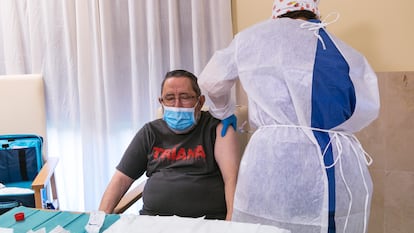Spain’s regions tighten restrictions as Covid-19 cases surge
Valencian authorities are confining 26 municipalities, Extremadura is closing bars and restaurants in its main cities, and La Rioja will limit all social gatherings to four people
After partially loosening restrictions during the Christmas holidays, Spanish regional governments are tightening their coronavirus measures again as cases continue to soar amid what experts are already describing as a third wave of the pandemic.
The decisions come as Health Ministry data on Tuesday showed a 25% rise in reported cases over the last seven days. Nine Spanish territories now have an incidence rate categorized as “extreme risk” by health authorities.
Authorities in the Valencia region have brought the overnight curfew starting time forward to 10pm, while bars and restaurants will have to close at 5pm. The government is also introducing restrictions on mobility after allowing travel within the region over Christmas: 26 municipalities are being confined for 14 days beginning on January 7 due to very high coronavirus incidence rates. These locations include Alcoy, Castalla and Polop in Alicante province, as well as Xàtiva, Ontinyent and Oliva in Valencia province.
Meanwhile, the regional borders will remain sealed to all but essential travel until January 31, in a two-week extension of the previous deadline. The Valencia region was the only one that did not allow travel across regional lines to meet with family for holiday gatherings between December 23 and January 6. The new measures were announced by Valencian premier, Ximo Puig, following a meeting to analyze the latest epidemiological data in the Mediterranean region. “The transmission of the virus is growing exponentially and requires a response from the Generalitat [Valencian government]”, said Puig, adding that schools are still scheduled to open on January 7 as planned.
Extremadura

In the western region of Extremadura, which has the highest incidence rate in Spain (604 cases per 100,000 inhabitants in the last 14 days), the regional government has announced that only preschool and primary school students will go back to the classrooms on January 11, while the older kids will have online classes at least until January 17.
Bars and restaurants, non-essential businesses and entertainment venues will have to close in municipalities with populations of over 5,000 and a 14-day incidence rate of over 500 cases per 100,000. This affects the provincial capitals of Badajoz and Cáceres as well as 14 other locations. These restrictions go in effect on January 7 for a seven-day period, although they could be extended.
Extremadura’s health chief, José María Vergeles, described the epidemiological situation in the region as “very complicated” and said the new measures aim to reduce the incidence rate “through a drastic reduction of mobility.”
Other regions
The small northern region of La Rioja will also introduce new restrictions on January 7. Social gatherings will be limited to four people, and the curfew will begin at 10pm. The regional health chief, Sara Alba, has asked citizens “to stay at home except for strictly necessary business” and recommended the use of face masks at all times, including inside the home, “especially for those who live with seniors or vulnerable people.”
Aragón was one of the first regions to announce new measures last week, when authorities decided to reseal regional and provincial borders starting on January 4. And Catalonia on Monday said that people will be confined to their municipalities for 10 days beginning on January 7, besides other measures.
In Castilla y León, regional premier Alfonso Fernández Mañueco said on Monday that regional borders will remain sealed beyond the official deadline of January 10. And the regional health chief, Verónica Casado, said that her government will request a two-week confinement at the next meeting of central and regional health authorities, known as the Inter-territorial Council of the National Health System. “This would be a good time to do so,” she said, adding that this decision must come from the central government because regional authorities lack the powers to do so.
Spain is currently under its second state of alarm since the beginning of the coronavirus pandemic. The emergency state was declared in October and is due to last six months, during which time regional governments may implement the coronavirus restrictions they see fit, including limits on fundamental rights such as freedom of movement, without risk of the courts overruling such measures. The first state of alarm between March and June left decisions in the hands of the central government, which introduced a strict home confinement to curb the spread of the virus.
English version by Susana Urra.
Tu suscripción se está usando en otro dispositivo
¿Quieres añadir otro usuario a tu suscripción?
Si continúas leyendo en este dispositivo, no se podrá leer en el otro.
FlechaTu suscripción se está usando en otro dispositivo y solo puedes acceder a EL PAÍS desde un dispositivo a la vez.
Si quieres compartir tu cuenta, cambia tu suscripción a la modalidad Premium, así podrás añadir otro usuario. Cada uno accederá con su propia cuenta de email, lo que os permitirá personalizar vuestra experiencia en EL PAÍS.
¿Tienes una suscripción de empresa? Accede aquí para contratar más cuentas.
En el caso de no saber quién está usando tu cuenta, te recomendamos cambiar tu contraseña aquí.
Si decides continuar compartiendo tu cuenta, este mensaje se mostrará en tu dispositivo y en el de la otra persona que está usando tu cuenta de forma indefinida, afectando a tu experiencia de lectura. Puedes consultar aquí los términos y condiciones de la suscripción digital.








































